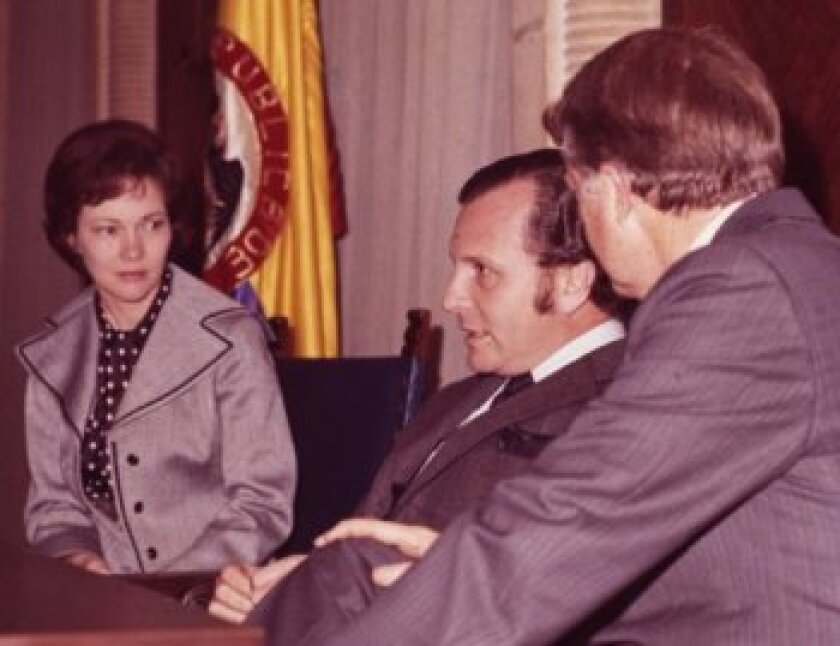As governor, Carter helped to reframe the governorship to focus upon international affairs, set the stage for how U.S. states would help to shape the global economy for decades, and redefine leadership in the economic and cultural transformation of the New South.
Carter was not the first governor to travel overseas — that was North Carolina’s Luther Hodges in 1959 as he recruited foreign direct investment from Europe. But Carter was an early pioneer in global commerce in ways that his predecessors and contemporaries were not, by focusing on Japan (not just Europe) and by devoting more time and energy to attracting foreign investment and promoting exports. “I probably devoted 25 percent of my time to either recruiting investments in Georgia from other states in the nation and also from overseas, or trying to sell Georgia products to foreign countries,” Carter told the National Governors Association (NGA) in 1978.
Carter established Georgia’s overseas offices — including one in Tokyo in 1973 — and visited 10 countries. While only four states had offices abroad in 1970, 33 had them by 1980. Carter’s actions inspired other governors and increased competition among states.
Indeed, my research finds that some Southern governors felt that international economic development work was a norm by the late 1970s and that the 1980s were the height of governors’ international travels as they built networks that enabled states to have an outsized impact in global interdependences.
Long-serving governors can more easily cement a legacy or reshape a role. Since Georgia governors could not serve two consecutive terms until the 1980s, it is important to recognize that as president Carter was likely the loudest proponent of governors’ international activities. Lamar Alexander, who served as Tennessee’s governor from 1978 to 1987, remembers President Carter saying, “Governors: go to Japan. Persuade them to make in the United States what they sell in the United States. Bring their plants and those jobs to our states.”
While Carter’s presidential predecessors Lyndon Johnson and Richard Nixon had encouraged efforts to attract foreign investment, Carter also pushed governors to sell exports. And Carter urged governors to be personally invested, because he knew that global networks would not form without a governor’s participation, particularly in formal business cultures. Governors’ travels overseas hit a high point in 1987, declining by half by 2000 as networks matured, communication options expanded, and other state officials managed linkages.

Carter encouraged healthy intergovernmental relations too. He pressed the NGA to establish its Committee on International Trade and Foreign Relations, and he understood that governors were not just another interest group lobbying in Washington, D.C. He said governors should seek help from the State Department and learn about military and political affairs. He knew that governors could represent their citizens’ interests beyond economic policy. Showcasing his humanitarian nature, Carter advised governors to practice personalized diplomacy by learning about “human interrelationships, social interrelationships, religious interrelationships that might deal with the particular country you visit.”
As governor, Carter also sought to improve civil rights, diversify the bureaucracy and bring all people into economic, social and political life. Along with the actions of other New South governors, this helped to usher in the South’s cultural and economic transformation, increasing its global competitiveness.
Unfortunately, official histories — at the NGA and State Department, for example — neglect the work of foreign economic policy by governors and presidents. Too many scholars still define “foreign relations” as defense policy and diplomacy, forgetting the blurred lines between “domestic” and “foreign” policy and that transnational issues present challenges and opportunities to states. This causes some scholars to assert that governors do not bring international experience to the table.
On the contrary, Jimmy Carter’s governorship showed that economic development is a vital issue and one with a significant global dimension for states as well as the nation. From Atlanta and later the Oval Office, he helped to mold the modern governorship, a legacy to remember.
Lucas McMillan is a professor of political science and dean of the College of Behavioral and Social Sciences at Lander University in Greenwood, S.C. His publications include The Involvement of State Governments in US Foreign Relations and many articles and book chapters.
Governing’s opinion columns reflect the views of their authors and not necessarily those of Governing’s editors or management.











